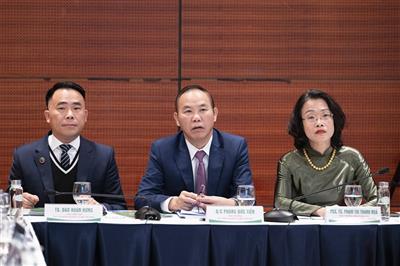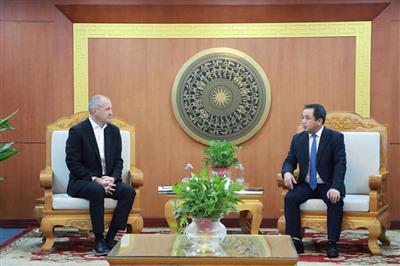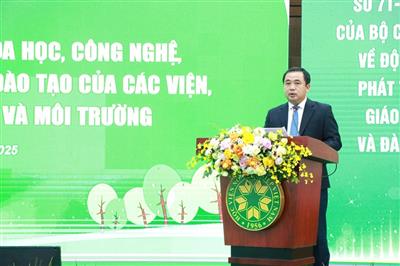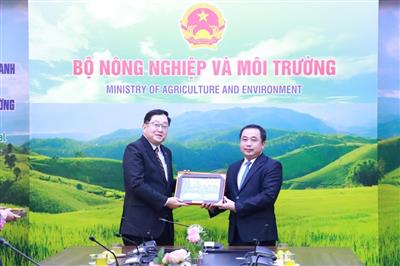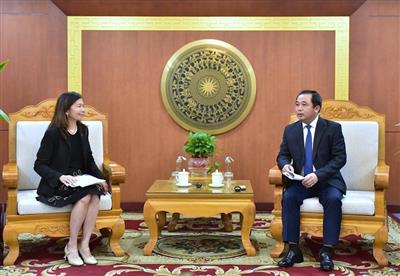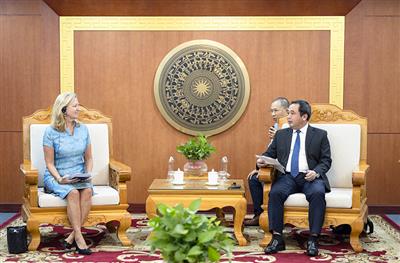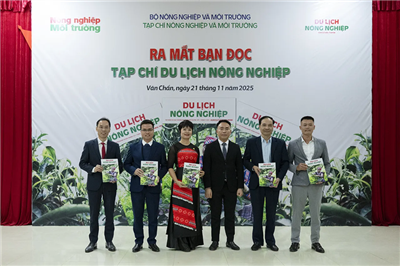
Minister of natural resources and environment Dang Quoc Khanh: Unity, harnessing intelligence and innovation for a sustainable and green Vietnam
10/02/2024TN&MTOn the occasion of the Lunar New Year in 2024, Dr. Đặng Quốc Khánh, Member of the Central Committee, Secretary of the Party's Executive Committee, Minister of Natural Resources and Environment, shared important insights with the media of the Natural Resources and Environment sector about the notable achievements in 2023 and the direction of the Ministry's work in 2024. TN&MT Magazine is pleased to introduce this content to readers.
.jpg)
Minister of natural resources and environment Dang Quoc Khanh
Reporter: Minister, could you please share the significant achievements of the Natural Resources and Environment sector in 2023?
Minister Đặng Quốc Khánh: Certainly, we have just gone through the year 2023 with many challenges. The international and domestic landscapes continue to change rapidly, complexly, and unpredictably with a mix of opportunities and difficulties. During this time, the Natural Resources and Environment sector faced various challenges including the clear impact of climate change, the persistent water scarcity, drought, and ongoing natural disasters that negatively affect socio-economic development and the implementation of sustainable development goals. Responding to resource constraints for effective resource exploitation in support of recovery and socio-economic development posed difficulties. Additionally, the implementation of the Environmental Protection Law of 2020 revealed some challenges. Adhering to the government's guiding principles of "Unity, Discipline - Resilience, Flexibility - Innovation, Creativity - Timeliness, Efficiency," the sector demonstrated a spirit of innovation and proactiveness in carrying out its tasks, leading to some notable achievements as follows:
In terms of institutional improvement and policies, the Ministry has taken the lead in mobilizing the participation of the entire sector and relevant agencies within the political system to organize a comprehensive review and assessment of the 10-year implementation of Resolution No. 24-NQ/TW dated June 3, 2013. This resolution focuses on proactively responding to climate change, enhancing resource management and environmental protection. The Ministry has provided counsel at the authorized level for the consideration and issuance of perspectives, strategies, directions, and innovative breakthrough solutions for the sector's development in the upcoming period.
There has been a strong focus on institutional development work, particularly with projects related to resource management laws: the amended Land Law, the amended Water Resources Law, and the Geology and Minerals Law. During the 6th session of the 15th National Assembly, significant progress was made with the passage of the amended Water Resources Law, introducing many new elements. This marks a substantial step forward in effective and sustainable resource management, aiming to ensure water source security. The project for the Geology and Minerals Law is currently undergoing further refinement to present to the Government for submission to the National Assembly in 2024, ensuring a comprehensive and updated legal framework for geological and mineral resource management.

Chairman of the National Assembly Vương Đình Huệ, Vice Chairman of the National Assembly Nguyễn Đức Hải, Vice Chairman of the National Assembly Trần Quang Phương, Deputy Prime Minister Trần Hồng Hà, Minister of Natural Resources and Environment Đặng Quốc Khánh took commemorative photos with the Drafting Committee and the Editorial Board of the Land Law (amended) after the closing session of the 5th extraordinary session of the 15th National Assembly.
More notably, the 15th National Assembly passed the amended Land Law during its 5th extraordinary session with the majority of delegates participating in the voting expressing their approval. This significant event marks innovations in land policy and legislation, aligning with the spirit of Resolution No. 18-NQ/TW dated June 16, 2022, of the 13th Central Committee of the Party on "Continuing to innovate, perfect the institutional system and policies, enhance the effectiveness of land management and land use, and create momentum for our country to become a high-income developed nation”. The drafting of the Land Law amendment was a responsible and meticulous effort undertaken by the National Assembly, the Standing Committee of the National Assembly, the Government and relevant agencies as well as organizations. The preparation process involved multiple stages and steps, demonstrating the careful approach of legislative bodies to ensure the quality and efficient utilization of land resources. The bill was presented to the National Assembly across four sessions, underscoring the commitment of these bodies to legislative activities and ensuring effective land resource management.
Secondly, there has been a focus on developing and completing national-level plans in accordance with the provisions of the Planning Law. These include: National Environmental Protection Planning for the period 2021-2030 with a vision towards 2050; National Network Planning for Environmental Monitoring Stations for the period 2021-2030 with a vision towards 2050; National Biodiversity Conservation Planning for the period 2021-2030 with a vision towards 2050; Comprehensive Planning for Sustainable Exploitation and Use of Coastal Resources for the phase 2021-2030 and a vision towards 2045; Comprehensive National Environmental Monitoring Planning for the phase 2021-2030 with a vision towards 2050.
Thirdly, there has been active and proactive participation with responsibility in cooperative mechanisms, anticipating opportunities arising from development trends.
A notable event over the past year was the Ministry's advisory role in organizing the Vietnam Delegation led by the Prime Minister to attend COP28 in the United Arab Emirates. At the conference, Prime Minister Phạm Minh Chính announced the Resource Mobilization Plan, marking a significant milestone towards implementing the Just Energy Transition Partnership (JETP), agreed upon between Vietnam and the International Partnership Group (IPG) and various other conferences.
Additionally, foreign affairs and international cooperation in the field of Natural Resources and Environment have been actively promoted. The Ministry has taken the lead in advising the Prime Minister, Deputy Prime Ministers, and actively participating in numerous international conferences and forums. Some prominent events include the 4th International Summit of the Mekong River Commission, the Climate Ambition Summit, the United Nations Water Conference, the 8th Vietnam-Netherlands Intergovernmental Committee Meeting on Climate Adaptation and Water Management and the P4G Summit. The Minister of Natural Resources and Environment led the Vietnamese delegation to attend the P4G Summit and on behalf of the Vietnamese government accepted the hosting of the P4G Summit in 2025. The Ministry has also actively participated in crucial international events such as the 17th ASEAN Ministerial Meeting on the Environment, the 34th ASEAN Senior Officials Meeting on the Environment, the Inter-Governmental Conference on Building a Global Agreement on Plastic Pollution, and the Inter-Governmental Meeting of the East Asia Acid Deposition Monitoring Network (EANET).
Fourthly, the entire sector has been actively and flexibly carrying out tasks and implementing management solutions effectively for natural resource optimization. It has provided advice to the government and the Prime Minister in issuing numerous important policies aimed at resolving bottlenecks, unleashing potentials, leveraging advantages, and utilizing natural resources for the country's economic and social development. Specifically: The sector provided advice and dealt with 172 projects and constructions that had not utilized land or were delayed in land utilization, covering an area of 6,922 hectares; Guidance and coordination with localities were undertaken to effectively carry out land recovery and clearance work to support the construction of national key projects, such as the Eastern North-South Expressway and Long Thanh International Airport; The sector successfully handled and ensured the supply of materials for key projects and constructions in the northern and Central Highlands regions. Priority was given to allocating sand for highway projects in the Mekong Delta region; Initiatives were taken to survey marine sand resources, identifying feasible exploitation areas for proposal to move into the exploration and exploitation phase to serve land reclamation and construction; Effective coordination with other ministries, sectors and localities was ensured for water regulation to support agriculture and electricity production during the complex drought situation.
Fifthly, the effectiveness of implementing policies and laws on environmental protection has continued to improve. There has been an emphasis on strengthening inspections, guidance and enhancing the responsibility of government authorities at all levels, businesses, investors, and raising public awareness on environmental issues (localities have relatively fully issued implementing documents for the 2020 Environmental Protection Law; the rate of industrial zones with centralized wastewater treatment systems has exceeded 92%; substantial completion of thorough treatment of facilities causing serious environmental pollution; the rate of household waste collection and treatment in urban areas has reached 95%, etc.).
Furthermore, the Ministry of Natural Resources and Environment has collaborated with the United Nations Development Program (UNDP) and partners both domestically and internationally to organize the "Vietnam Circular Economy Forum 2023." This forum aims to identify the roadmap, promote public-private partnerships, and mobilize bilateral and multilateral resources from international organizations and the business community. It serves as a crucial foundation for the Ministry to refine and submit to the Prime Minister for consideration and issuance of the National Action Plan on Circular Economy implementation until 2030.
Sixthly, digital transformation and database construction within the Natural Resources and Environment sector have received significant investment attention, contributing to enhancing the efficiency of state management, providing public services, and solving administrative procedures for citizens and businesses. The Ministry of Natural Resources and Environment ranks 3rd out of 17 ministries and ministerial-level agencies in terms of digital transformation (with public services); all 63 provinces and cities are urgently deploying database construction and nationwide; databases have been established in 450 out of 705 districts. The land database of all 63 provinces and cities has been connected to the national database on population with 461 out of 705 districts, 6,198 out of 10,599 communes/wards, totaling more than 26 million land parcels. The timely and effective processing of millions of transactions, exploitation, retrieval and verification of electronic land and population information have reached level 4 in the Land Database System and National Population Database on the National Public Service Portal and the Administrative Procedure Resolution Information System at the provincial level.
Seventhly, there has been proactive and detailed early forecasting with a high level of reliability in weather forecasting and climate change. This is attributed to the active, effortful and positive contributions of the meteorological sector in monitoring and forecasting weather, enhancing the application of scientific and technological advancements and engaging in international cooperation. The sector has provided timely forecast information and warnings to cope with the impact of the first storm, heatwaves and drought caused by the El Nino phenomenon, contributing to reducing the damage caused by natural disasters. The issuance of timely and effective forecast and warning bulletins for heavy rain, floods, inundation, flash floods and landslides has also been emphasized.
Reporter: At the 5th extraordinary session of the 15th National Assembly, the Land Law (amended) was passed. Could you please share about the process of drafting this law and its new points?
Minister Đặng Quốc Khánh: The Land Law is a significant and crucial legislative project in political, economic and social aspects, defense-security and environmental conservation of the country. It plays a central role in the legal system related to land, deeply impacting various layers of the population, business communities, and having close connections with many other relevant laws. The National Assembly's approval of the Land Law (amended) establishes the legal basis for practical implementation, contributing to optimizing the use of land resources in an economical, efficient, and sustainable manner in this new stage. The goal is to maximize the potential of land resources to meet the requirements of socio-economic development, extensive international integration, aligning with the 4.0 industrial revolution, and timely responding to the aspirations and desires of the people.
The drafting agency has organized numerous workshops and conferences in collaboration with institutions such as the Central Committee of the Fatherland Front of Vietnam, the Vietnam Union of Science and Technology Associations, the Council of Ethnic Minorities, the Economic Committee, and several other committees of the National Assembly. Also, it has coordinated with organizations like the Vietnam Chamber of Commerce and Industry, the Vietnam Farmers' Union, the Vietnam General Confederation of Labor, and the Central Committee of the Vietnam Women's Union to conduct seminars and conferences to gather opinions on the draft Land Law.
The amended Land Law has been passed with significant breakthrough content contributing to the goal of improving institutional mechanisms, policies, enhancing the effectiveness and efficiency of land management and land use, such as: land planning and land use planning; land recovery, compensation, support, and resettlement; land allocation, lease, and land use purpose transfer permission; land finance, land prices; land registration, and certificate issuance; land policies for ethnic minorities; establishment of information systems and databases on land; promoting decentralization, delegation of authority, administrative procedure reform in the field of land, and enhancing the responsibility of local governments at all levels in land management and use.
We believe that when the Land Law (amended) takes effect, land resources will be managed, exploited and utilized in an economical, sustainable and highly efficient manner, meeting the requirements of accelerating socio-economic development, ensuring social justice and stability, national security, environmental adaptation, real estate market development, where the land use rights market becomes a reasonable, fair, and effective channel for land allocation. This will serve as a driving force for Vietnam to become a high-income developed country by 2045.
Reporter: The international community highly praises the success of elevating Vietnam's position and role at the COP28 conference. Could you please share the steps Vietnam is taking to commit to achieving net-zero emissions?
Minister Đặng Quốc Khánh: At the COP28 conference, Vietnam, together with international partners, announced the Plan to Mobilize Resources to implement the Joint Emission Trading Platform (JETP). This achievement involves selecting priority areas that can become pillars supporting the future energy transition. Immediately after the conclusion of COP28, Prime Minister Phạm Minh Chính attended the first summit on "Asia Zero Emission Community (AZEC)" with the participation of high-level leaders from ASEAN countries, Japan, and Australia (on December 18, 2023, in Tokyo, Japan). At this event, Prime Minister Phạm Minh Chính conveyed a strong message with the theme: "Shared determination, high resolve, and decisive action towards an Asia with net-zero emissions development."
At international forums, Vietnam has proposed key areas for promoting future cooperation, focusing on researching and developing diversified clean energy sources and new technologies. The country aims to accelerate technology transfer to ensure widespread access to clean energy, meeting affordability in the Asian region. Ensuring the adaptation of clean energy conversion to the specific conditions of each country is also a priority. Simultaneously, Vietnam advocates for stronger financial climate mechanisms, public-private cooperation, and regional collaboration involving the private sector. This aims to create favorable conditions for developing countries to access preferential capital and enhance cooperation in high-quality human resources training and smart management.
These achievements result from Vietnam actively and proactively implementing commitments made since COP26 in 2021. From policies to actions, the government, under the inspiration and guidance of Prime Minister Pham Minh Chinh, has demonstrated a "walk the talk" spirit, which resonated strongly at the recent COP28 conference.
Vietnam has left its mark by comprehensively implementing the commitments made at COP26, specifically approving significant decisions and policies. These include the Action Plan to implement COP26 results, the National Strategy on Climate Change until 2050, the Green Growth Strategy for the period 2021-2030 with a vision to 2050, the National Action Plan to reduce greenhouse gas emissions by 2030, the National Strategy for Forests and Sustainable Development until 2030 based on the Glasgow Declaration, the Action Program on Green Energy Transformation, Carbon and Methane Emission Reduction in the transportation sector, the Comprehensive National Energy Development Plan, the development of 1 million hectares of high-quality, low-emission rice, and the establishment and implementation of Nationally Determined Contributions (NDC).
Localities nationwide, businesses and government authorities at all levels are actively investing in green transformation. Many provinces and cities are encouraging investment in renewable energy projects, especially wind and solar power. Corporations and businesses are actively implementing green transformation projects, gradually reducing dependence on fossil energy sources, developing plans to reduce greenhouse gas emissions, and exploring new energy sources such as hydrogen to achieve carbon neutrality goals.
Currently, Ministry of Natural Resources and Environment (MoNRE) is collaboratively working with various ministries and sectors on guidelines for greenhouse gas inventory, measures to reduce methane emissions, establishing a green banking development model, investing in and improving pollution treatment technologies, recycling, and waste management. Furthermore, they are implementing solutions for carbon recovery and storage, investing in CO2 recovery systems, promoting green transformation, and demonstrating active participation in global climate change response.
Reporter: In 2024, the theme and action motto set by MoNRE are: "Being Unite – Disciplined, Proactive - Flexible, Timely - Efficient, Innovative - Breakthrough." Could you please share the important tasks that MoNRE is focusing on to achieve these set goals?
Minister Đặng Quốc Khánh: In 2024, as outlined in Government Resolution No. 01/NQ-CP, it is considered a breakthrough year, holding particular significance in successfully implementing the resolutions of the 13th Party Congress, the National Assembly's resolution on the 5-year socio-economic development plan for 2021-2025, and providing momentum for the subsequent years to achieve the goals of the 5-year plan (2021-2025). Considering the anticipated fast-paced, complex, and unpredictable global developments and the domestic situation with a mix of opportunities and challenges, overcoming difficulties and challenges remains the primary focus in the socio-economic sphere.
Given the current context and situation, in 2024, the Ministry will closely adhere to the Conclusions and Resolutions of the Central Committee, the National Assembly, and the Government, concretizing them for the implementation of specific goals and tasks in 2024 under the theme: "Discipline, Timely Proactivity, Accelerated Innovation, Sustainable Efficiency" and "05 Resolutions"; "06 Principles, guiding directions" as stated by Prime Minister Pham Minh Chinh at the conference on the implementation of tasks for the Government and localities. In this regard, I would like to emphasize some key tasks, specifically:
Firstly, continue to focus on building, improving institutions, policies, and laws. Organize the full implementation of Resolutions, Conclusions, and Directives of the Central Committee, especially the implementation of the Politburo's Conclusion on the continued implementation of Resolution No. 24-NQ/TW dated June 3, 2013, on proactively responding to climate change, strengthening resource management, and environmental protection; Resolution No. 18-NQ/TW on "Continuing to innovate, improve institutions, policies, enhance the effectiveness of management and sustainable development, creating momentum for Vietnam to become a high-income country"; Resolution No. 36-NQ/TW on the Sustainable Development Strategy for Vietnam's marine economy.
The organization of the implementation of the Environmental Protection Law in 2020, the amended Land Law, and the amended Water Resources Law will be submitted to the National Assembly for review of the Construction Law and Urban Planning Law. At the same time, there will be an urgent effort to develop, submit, and issue, within the authorized scope, guiding documents to ensure consistency, uniformity, and timely effectiveness simultaneously with the mentioned legislative projects. Continuing to refine the draft decrees submitted to the Government to address difficulties and challenges in the fields of land, environment, sea and islands.
The focus will be on improving and submitting to the Prime Minister for issuance and implementation of national plans, sectoral plans, and plans in the field of Natural Resources and Environment to ensure consistency, uniformity, and effectiveness in the management of natural resources and the environment; Completing The National Maritime Spatial Planning to be submitted for approval by the competent authorities.
Secondly, the focus will be on administrative procedure reform and improving the investment and business environment, promoting digital transformation, and developing digital resources; Implementing a minimum 10% simplification of administrative procedures and compliance costs in the field of Natural Resources and Environment as required by the Government in Resolution No. 02/NQ-CP; Completing the requirements of the Prime Minister on cutting, simplifying regulations related to business activities within the functional scope of natural resources and environment management of the Ministry.
Demonstrating a high determination, striving to accelerate the construction progress of the national land information system, and land database according to unified standards nationwide, integrated with the national population database, ensuring the completion of tasks assigned by the Central Executive Committee, the National Assembly in Resolution No. 18-NQ/TW, and Resolution No. 39/2021/QH15.
The third focus is on synchronously implementing tasks to manage, exploit, and efficiently use natural resources to serve economic and social development. Continuing to concentrate on planning to ensure land reserves for development; resolving obstacles in investment projects based on inspection and examination conclusions to free up state resources and social resources for development. Implementing geological hazard investigations in areas at risk of landslides and earthquakes; Studying the geological conditions of urban infrastructure to support the development of underground structures and potential mineral resources, such as metals and rare earths, serving the semiconductor industry and the production of environmentally friendly devices and vehicles in line with global energy transition trends.
The fourth point is to rigorously enforce the legal provisions on environmental protection, bringing about fundamental changes in the perception and actions of the public, businesses, and managers in environmental protection; Proposing the establishment of a national target program to address pollution and improve environmental quality, focusing on addressing environmental pollution in the North Red River Delta irrigation system and river basins as well as the environmental issues associated with power projects.
In the fifth point, the focus is on further enhancing participation in international and regional initiatives on the environment and climate, elevating environmental diplomacy to attract resources, knowledge, and experience to contribute to the construction and improvement of environmental policies and laws for sustainable development. It involves resolutely and urgently implementing the Action Program to fulfill commitments at COP28 and implementing the mobilization plan to realize the political declaration on a just energy transition (JETP).
The sixth point emphasizes improving the work of forecasting and warning of natural disasters. Efficiently utilizing investment resources to modernize remote sensing infrastructure, surveying, mapping, geographic information, providing timely, complete, and accurate information for various sectors to serve socioeconomic development and timely and effective response to extreme weather events.
Promoting the application of remote sensing technology in resource monitoring and environmental surveillance to meet the needs of ministries, sectors, and localities in planning and implementing socioeconomic development. This includes monitoring and supervising certain types of land use changes, water resources dynamics, cross-border air pollution, and changes in national border areas.

Minister Đặng Quốc Khánh inspected the actual environmental conditions of the North Red River Delta irrigation system.
The seventh point focuses on strengthening inspection and examination activities to enhance the effectiveness of natural resources and environmental management, combat corruption, waste, negative phenomena, and group interests. It involves implementing inspection and examination plans in an efficient and non-duplicative manner, concentrating on complex and sensitive areas such as land, environment, and minerals. In particular, responding to the proposals from localities at the Sector's concluding conference, the Ministry will intensify checks on policy and legal implementation to detect and rectify any inconsistencies promptly, thereby limiting irregularities.
To successfully carry out the mentioned tasks above, the Ministry of Natural Resources and Environment will provide guidance for implementing the following key measures:
First and foremost, the Party Committee of the Ministry and its subordinate levels should focus on enhancing the leadership capabilities and combat readiness of the party organization and its members. Build a team of officials, civil servants, and workers with the necessary qualities, abilities and credibility commensurate with their responsibilities. This is a task that the Prime Minister emphasized particularly in the directive speech to the sector during the 2023 work summary conference.
Implement proactive, flexible, timely and effective management directives with close coordination, synchronization and coherence among various policies. Stay closely attuned to practical situations, respond promptly and appropriately to policy changes, especially for urgent issues arising in the short term. Simultaneously, execute tasks and solutions effectively with a fundamental approach for both the medium and long term. The leadership of the Ministry and the heads of its subordinate units should strengthen collaboration with local authorities and grassroots organizations to stay well-informed and ensure comprehensive results in the enforcement of policies and laws within their assigned management areas.
Discipline is to be tightened, adherence to principles and regulations enhanced, and the effectiveness and responsibility of leaders in performing unit tasks elevated. Decentralization and empowerment should be strengthened, aligning with appropriate resource allocation to enhance implementation capacity. Furthermore, there should be increased supervision, monitoring, and control of power. Rigorous correction is necessary to eliminate avoidance and shifting of responsibility during duty execution. Simultaneously, protection must be provided for officials who dare to think, act and take responsibility for the common interest.
Strictly adhere to regulations regarding assignment and hierarchy, ensuring clear responsibilities in accordance with the principles that the Ministry does not directly undertake tasks within its jurisdiction or that can be delegated to local authorities; enhance the role of the Ministry and its subordinate units in policy direction, strategy development, strengthen inspection, examination, and supervision of the implementation of local policies and laws."
Continuing the review, restructuring, and completion of the organizations with the goal of building a modern, professional, and efficient administrative system. In task assignment and coordination among units, it is crucial to adhere to the principle of "clear person, clear task" to avoid neglecting responsibilities. Emphasis should be placed on training and developing the capabilities and skills of officials and civil servants, aligning them with their job positions. There is a need to increase investment and enhance the capabilities of the Ministry's university training institutions, not only focusing on theoretical research and teaching but also integrating practical aspects. Specifically, there should be a concentration on training in the fields of environmental protection, management, efficient resource utilization and adaptation to climate change.
Enhance the effectiveness evaluation tools for the performance of officials and civil servants, particularly focusing on assessing the leadership and guidance of the heads of units under the Ministry. Emphasize criteria such as providing regular strategic counsel to the Ministry's leadership on fundamental and long-term issues, depth of understanding and close monitoring of local and grassroots situations. Handle and address recommendations efectively from the ministry, sector, localities as well as from citizens and businesses.
Reporter: Thank you for your valuable insights!




